2023年中考英语一轮复习 七年级下册Unit 1~Unit 6课件(共116张PPT)
文档属性
| 名称 | 2023年中考英语一轮复习 七年级下册Unit 1~Unit 6课件(共116张PPT) |  | |
| 格式 | pptx | ||
| 文件大小 | 856.9KB | ||
| 资源类型 | 教案 | ||
| 版本资源 | 人教新目标(Go for it)版 | ||
| 科目 | 英语 | ||
| 更新时间 | 2023-06-08 08:25:44 | ||
图片预览

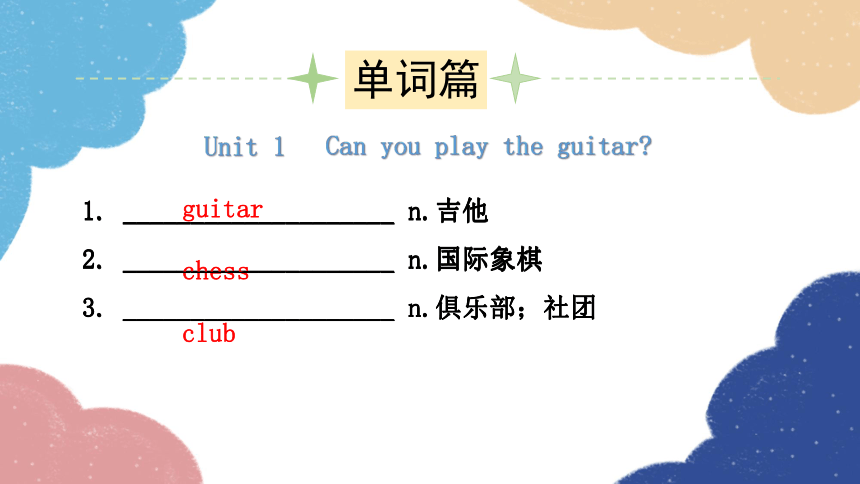
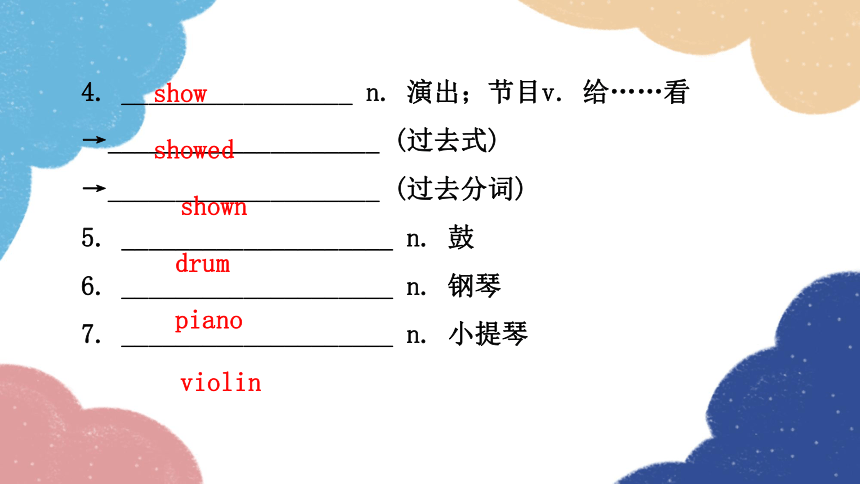
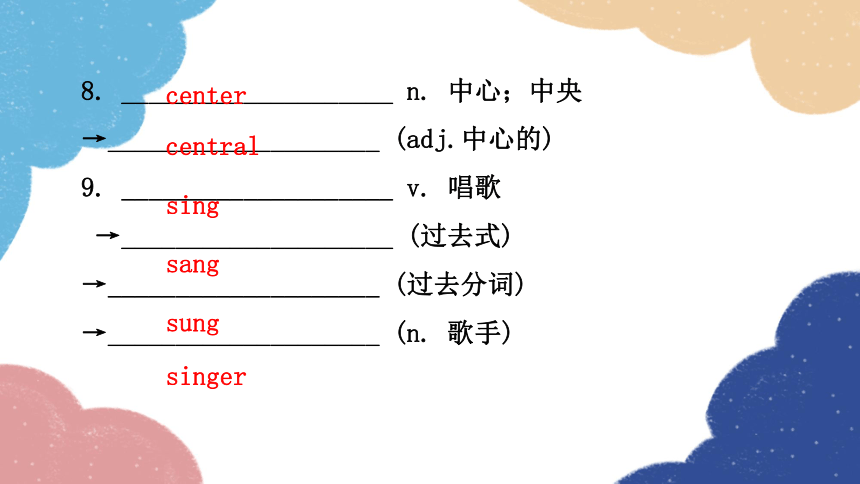
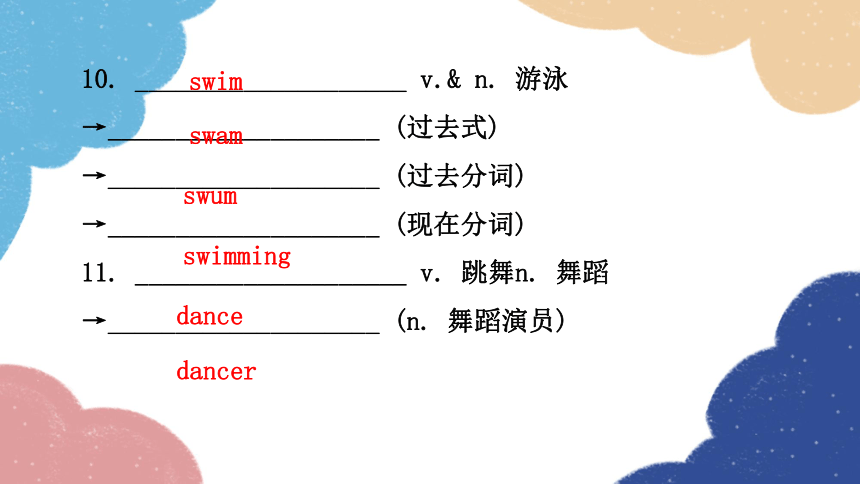
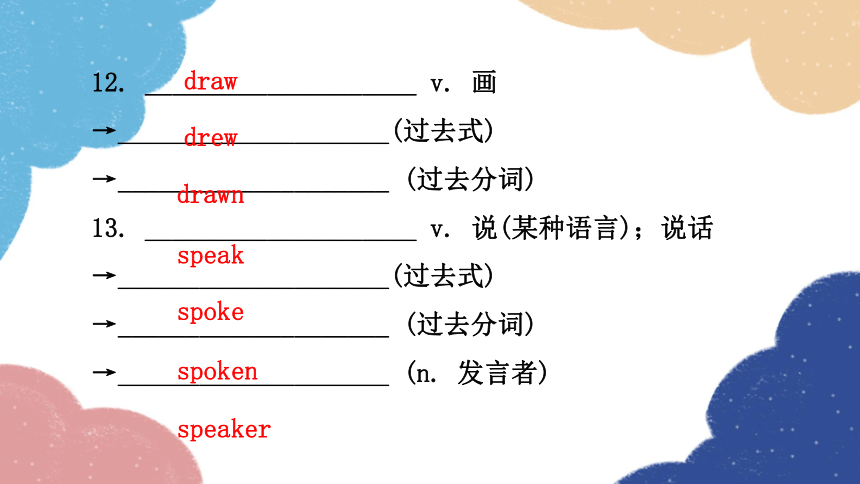
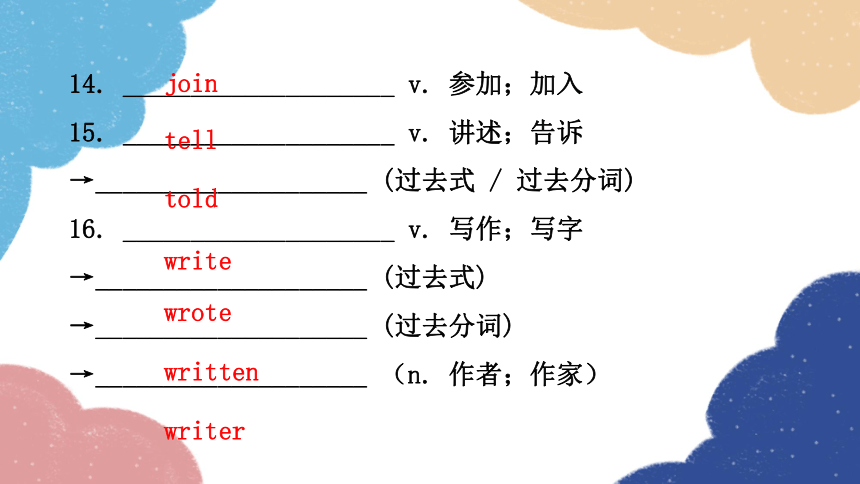
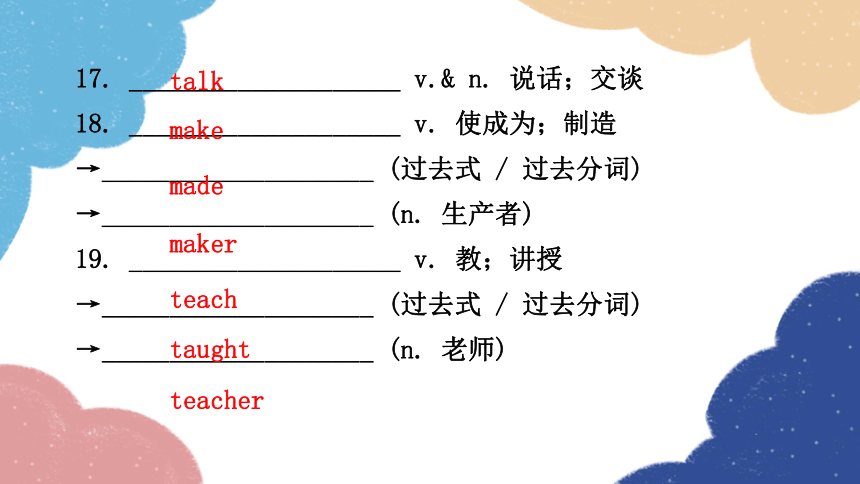
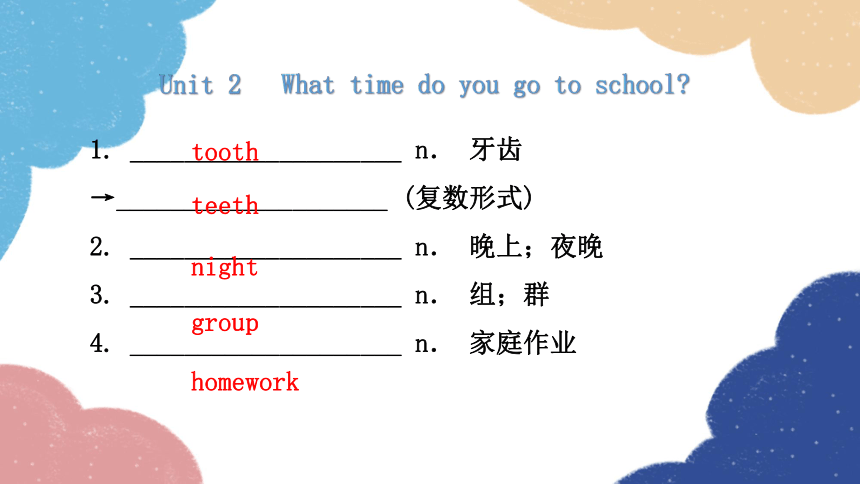
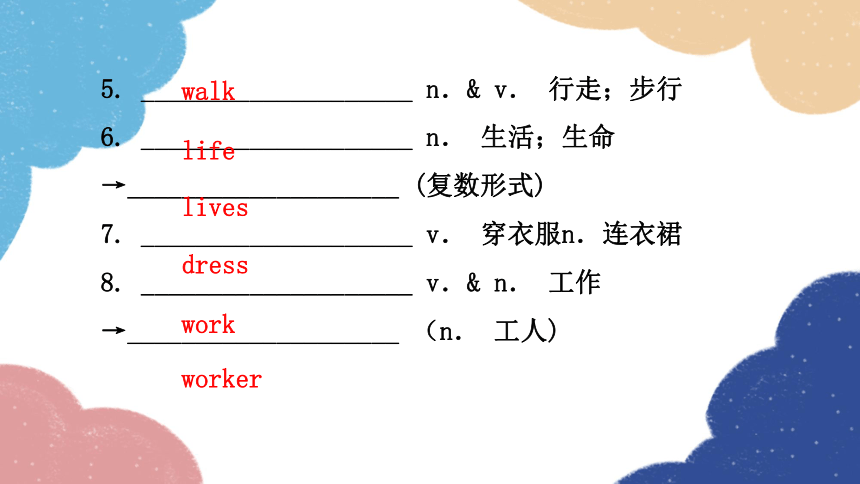
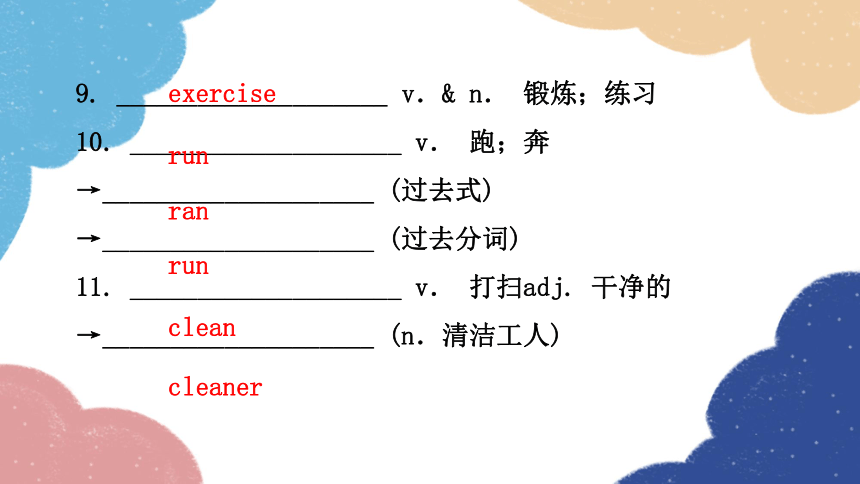
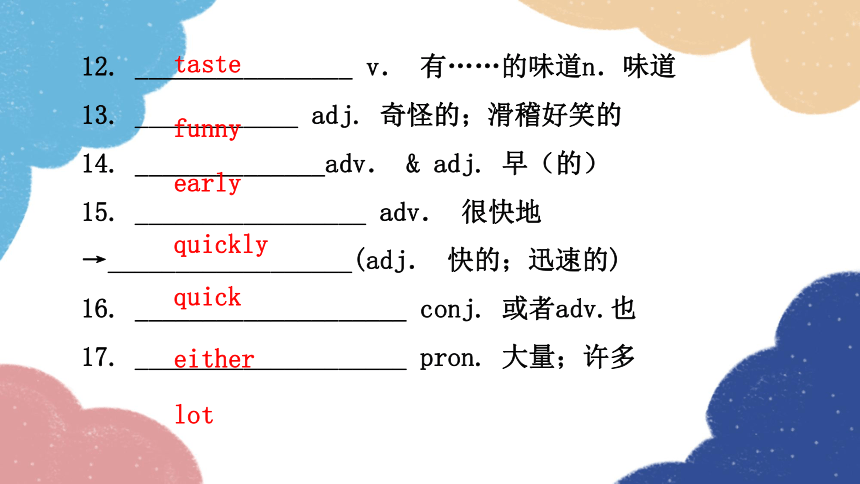
文档简介
(共116张PPT)
教材梳理(RJ)
七年级下册 Unit 1~Unit 6
Unit 1 Can you play the guitar
单词篇
1. ____________________ n.吉他
2. ____________________ n.国际象棋
3. ____________________ n.俱乐部;社团
guitar
chess
1. ____________________ n.吉他
2. ____________________ n.国际象棋
3. ____________________ n.俱乐部;社团
club
4. _________________ n. 演出;节目v. 给……看
→____________________ (过去式)
→____________________ (过去分词)
5. ____________________ n. 鼓
6. ____________________ n. 钢琴
7. ____________________ n. 小提琴
show
showed
shown
drum
piano
violin
8. ____________________ n. 中心;中央
→____________________ (adj.中心的)
9. ____________________ v. 唱歌
→____________________ (过去式)
→____________________ (过去分词)
→____________________ (n. 歌手)
center
central
sing
sang
sung
singer
10. ____________________ v.& n. 游泳
→____________________ (过去式)
→____________________ (过去分词)
→____________________ (现在分词)
11. ____________________ v. 跳舞n. 舞蹈
→____________________ (n. 舞蹈演员)
swim
swam
swum
swimming
dance
dancer
12. ____________________ v. 画
→____________________(过去式)
→____________________ (过去分词)
13. ____________________ v. 说(某种语言);说话
→____________________(过去式)
→____________________ (过去分词)
→____________________ (n. 发言者)
draw
drew
drawn
speak
spoke
spoken
speaker
14. ____________________ v. 参加;加入
15. ____________________ v. 讲述;告诉
→____________________ (过去式 / 过去分词)
16. ____________________ v. 写作;写字
→____________________ (过去式)
→____________________ (过去分词)
→____________________ (n. 作者;作家)
join
tell
told
write
wrote
written
writer
17. ____________________ v.& n. 说话;交谈
18. ____________________ v. 使成为;制造
→____________________ (过去式 / 过去分词)
→____________________ (n. 生产者)
19. ____________________ v. 教;讲授
→____________________ (过去式 / 过去分词)
→____________________ (n. 老师)
talk
make
made
maker
teach
taught
teacher
Unit 2 What time do you go to school
1. ____________________ n. 牙齿
→____________________ (复数形式)
2. ____________________ n. 晚上;夜晚
3. ____________________ n. 组;群
4. ____________________ n. 家庭作业
tooth
teeth
night
group
homework
5. ____________________ n.& v. 行走;步行
6. ____________________ n. 生活;生命
→____________________ (复数形式)
7. ____________________ v. 穿衣服n.连衣裙
8. ____________________ v.& n. 工作
→____________________ (n. 工人)
walk
life
lives
dress
work
worker
9. ____________________ v.& n. 锻炼;练习
10. ____________________ v. 跑;奔
→____________________ (过去式)
→____________________ (过去分词)
11. ____________________ v. 打扫adj. 干净的
→____________________ (n.清洁工人)
exercise
run
ran
run
clean
cleaner
12. ________________ v. 有……的味道n.味道
13. ____________ adj. 奇怪的;滑稽好笑的
14. ______________adv. & adj. 早(的)
15. _________________ adv. 很快地
→__________________(adj. 快的;迅速的)
16. ____________________ conj. 或者adv.也
17. ____________________ pron. 大量;许多
taste
funny
early
quickly
quick
either
lot
Unit 3 How do you get to school
1. ____________________ n. 火车
2. ____________________ n. 公共汽车
3. ____________________ n. 地铁
4. ____________________ n. 自行车
train
bus
subway
bike
5. ____________________ n. 分钟
6. ____________________ n. 千米;公里
7. ____________________ n. 小汽车;轿车
8. ____________________ n. 车站; 停止
9. ____________________ n. 河;江
minute
kilometer
car
stop
river
10. ______________n. 梦想; 睡梦v. 做梦
→____________________(过去式)
→____________________ (过去分词)
11. ____________________ v. 骑n. 旅程
→____________________ (过去式)
→____________________ (过去分词)
dream
dreamt / dreamed
dreamt / dreamed
ride
rode
ridden
12. ____________________ v. 开车
→____________________ (过去式)
→____________________ (过去分词)
13. ____________________ v. 离开;留下
→____________________ (过去式 / 过去分词)
drive
drove
driven
leave
left
Unit 4 Don' t eat in class.
1. ____________________ n.规则;规章
2. ____________________ n.大厅;礼堂
3. ____________________ n. 幸运;运气
→____________________ (adj.幸运的)
→____________________ (adv. 幸运地)
→____________________ (adj.不幸的)
rule
hall
luck
lucky
luckily
unlucky
4. ____________________ v. 到达
5. ____________________ v.& n. 打架;战斗
→____________________ (过去式 / 过去分词)
6. ____________________ v. 穿;戴
→____________________ (过去式)
→____________________ (过去分词)
arrive
fight
fought
wear
wore
worn
7. ____________________ v. 带来;取来
→____________________ (过去式 / 过去分词)
8. ____________________ v.& n. 练习
9. ____________________ v. 读;阅读
→____________________ (过去式 / 过去分词)
→____________________ (n. 读者)
bring
brought
practice
read
read
reader
10. ____________________ v. 感受;觉得
→____________________ (过去式 / 过去分词)
→____________________ (n.感觉)
11. ____________________ v. 记住;记起
12. ____________________ v. 遵循;跟随
feel
felt
feeling
remember
follow
13. ____________________ v. 保持;保留
→____________________ (过去式 / 过去分词)
→____________________ (n. 保管人)
14. ____________________ v. 学习;学会
→____________________ (过去式)
→____________________ (过去分词)
→____________________ (n. 学习者)
keep
kept
keeper
learn
learnt / learned
learnt / learned
learner
15. ____________________ adj. 重要的
→____________________ (n. 重要性)
→____________________ (adv. 重要地)
16. ____________________ adj. 安静的
→____________________ (adv. 轻声地)
17. ____________________ adj. 吵闹的
→____________________ (n. 噪音)
important
importance
importantly
quiet
quietly
noisy
noise
18. _________________ adj. 非常讨厌的; 可怕的
→____________________ (adv. 严重地)
19. ____________________ adj. 严格的;严厉的
→____________________ (adv. 严格地)
20. ____________________ adv. 外出
terrible
terribly
strict
strictly
out
1. ____________________ n. 熊猫
2. ____________________ n. 动物园
3. ____________________ n. 老虎
4. ____________________ n. 大象
Unit 5 Why do you like pandas
panda
zoo
tiger
elephant
5. ____________________ n. 狮子
6. ____________________ n. 长颈鹿
7. ____________________ n. 动物
8. ____________________ n. 种类
9. ____________________ n. 地点;位置
10. ____________________ n.水
lion
giraffe
animal
kind
place
water
11. ____________________ n. 危险
→____________________ (adj. 危险的)
12. ____________________ v. 救;救助
13. ____________________ v. 忘记;遗忘
→____________________ (过去式)
→____________________ (过去分词)
danger
dangerous
save
forget
forgot
forgotten
14. ____________________ v.砍;切
→____________________ (过去式 / 过去分词)
15. ____________________ adj. 可爱的;机灵的
16. ____________________ adj. 懒散的;懒惰的
17. ____________________ adj. 聪明的
cut
cut
cute
lazy
smart
18. ____________________ adj. 美丽的;美好的
19. ____________________ adj. 友好的
20. ____________________ adj. 羞怯的;腼腆的
beautiful
friendly
shy
1. ____________________ n. 报纸
2. ____________________ n. 汤
3. ____________________ n. 茶;茶叶
4. ____________________ n. 游泳池;水池
Unit 6 I' m watching TV.
newspaper
soup
tea
pool
5. ____________________ n. 超市
6. ____________________ n. 男人;人
→____________________ (复数形式)
7. ____________________ n. 竞赛
8. ____________________ n. 儿童
→____________________ (复数形式)
supermarket
man
men
race
child
children
9. ____________________ v. 洗
10. ____________________ v. 喝n. 饮料
→____________________ (过去式)
→____________________ (过去分词)
11. ____________________ v. 购物n. 商店
→____________________ (n. 购物)
wash
drink
drank
drunk
shop
shopping
12. ____________________ v.& n. 学习;研究
13. ____________________ v. 怀念;思念;错过
14. ____________________ v. 希望
15. ____________________ adj. 美国的n.美国人
→____________________ (n. 美国)
study
miss
wish
American
America
16. ____________________ adj. 幼小的;年轻的
17. ____________________ adj. 可口的;美味的
18. ____________________ adv. 在明天n.明天
young
delicious
tomorrow
短语篇
1.下国际象棋 ____________________
2.说英语 ____________________
3.擅长于…… ____________________
4.结交朋友 ____________________v
play chess
speak English
be good at ...
make friends
5.(在)周末 ____________________________
6.跟……说 ____________________
7.善于应付……的 ____________________
8.在某方面帮助(某人) ____________________
9.穿上衣服 ____________________
on the weekend / on weekends
talk to ...
be good with ...
help (sb.) with sth.
get dressed
10.刷牙 ____________________
11.洗淋浴 ____________________
12.起床;站起 ____________________
13.做作业 ____________________
14.散步;走一走 ____________________
brush (one' s) teeth
take a shower
get up
do (one' s) homework
take a walk
15.大量;许多 ____________________
16.半小时 ____________________
17.要么……要么…… ____________________
18.骑自行车 ____________________
19.开车 ____________________
20.公共汽车停靠站 ____________________
lots of
half an hour
either ... or ...
ride a bike / by bike
drive one' s car
bus stop
21.地铁站 ____________________
22.认为;想起 ____________________
23.在……和……之间 ____________________
24.实现;成为现实 ____________________
25.到达 ____________________
subway station
think of
between ... and ...
come true
get to
26.乘火车 / 公共汽车 / 地铁 / 小船 ________________________________________
27.准时 ____________________
28.听音乐 ____________________
29.必须;不得不 ____________________
take the / by train / bus / subway / boat
(be) on time
listen to music
have to
30.穿校服 ________________________
31.外出(娱乐) ____________________
32.清洗餐具 ____________________
33.在上学期间 ____________________
34.铺床 ____________________
wear the school uniform
go out
do the dishes
on school days
make one' s bed
35.(对某人)要求严格 ____________________
36.制订规则 ____________________
37.遵守规则 ____________________
38.留短发 ____________________
39.学习做某事 ____________________
be strict (with sb.)
make rules
follow the rules
keep one' s hair short
learn to do sth.
40.玩得开心 ____________________
41.稍微;有点儿 ____________________
42.迷路 ____________________
43.处于(极大)危险之中 ____________________
44.砍倒 ____________________
45.为了……而猎杀…… ____________________
have fun
kind of
get lost
be in (great) danger
cut down
kill ... for ...
46.失去家园 ____________________
47.由……制成的 ____________________
48.看报纸 ____________________
49.去电影院 ____________________
50.出去吃饭 ____________________
lose one' s home
(be) made of
read a newspaper
go to the movies
eat out
51.喝茶 ____________________
52.做汤 ____________________
53.端午节 ____________________
54.加入某人一起做某事 ____________________
drink tea
make soup
Dragon Boat Festival
join sb. for sth.
课文篇
句式复习
1.你很擅长讲故事。
________________________________________
You are very good at telling stories.
2.——你想要加入什么俱乐部?
__________________________________________
——我想要加入国际象棋俱乐部。
__________________________________________
3.我没多少时间吃早餐。
___________________________________________
—What club do you want to join?
—I want to join the chess club.
I don' t have much time for breakfast.
4.晚上我要么看电视要么玩电脑游戏。 ___________________________________________
___________________________________________5.——你怎样上学?
_________________________________________
——我骑自行车(上学)。
___________________________________________
In the evening, I either watch TV or play computer games.
—How do you get to school?
—I ride my bike.
6.——你到学校要用多少时间?
_________________________________________
——骑自行车大约15分钟。
___________________________________________ 7.别把脏碗留在厨房里!
___________________________________________
—How long does it take you to get to school?
—About 15 minutes by bike.
Don' t leave the dirty dishes in the kitchen!
8.——我们可以在教室里吃东西吗? _________________________________________
——不,不可以,但是我们可以在餐厅吃。___________________________________________9.——你为什么不喜欢那只猫?
__________________________________________
——因为她有点儿无聊。
___________________________________________
—Can we eat in the classroom?
—No,we can' t,but we can eat in the dining hall.
—Why don' t you like the cat?
—Because she' s kind of boring.
10.大象能够长时间行走而且从不迷路。___________________________________________
___________________________________________11.你想跟我一起吃个饭吗?
___________________________________________12.他爸爸和叔叔正在看电视上的龙舟比赛。___________________________________________
___________________________________________
Elephants can walk for a long time and never get lost.
Do you want to join me for dinner?
His dad and uncle are watching the boat races on TV.
语篇再现
Passage 1【七年级下册Unit 3】
How do you get to school Do you walk or 1.__________ a bike Do you go by bus or by train For many students, it is easy to get to school. But for the students in one small village in China, it is
ride
2.__________. There is a very big river 3.__________ their school and the village. There is no 4.__________ and the river runs too 5.__________ for boats. So these students go on a ropeway to 6.__________ the river to school.
difficult
between
bridge
quickly
cross
One 11-year-old boy, Liangliang, crosses the river every school day. But he is not 7.__________ because he loves school. “I love to play with my classmates. And I love my teacher. He' s 8.__________ a father to me.”
afraid
like
Many of the students and villagers never 9.__________ the village. It is their 10.__________ to have a bridge. Can their dream come true
leave
dream
Passage 2【七年级下册Unit 5】
Hello. We are students from Thailand, and we want to 1.__________ the elephants. The elephant is one of Thailand' s symbols. Our first 2.__________ had a white elephant on it. This is a symbol 3.__________ good luck.
save
flag
of
Elephants are smart animals. They can play soccer 4.__________ music. They can also draw very well. People say that “an elephant never forgets”. Elephants can walk for a long time and never get 5.__________. They can also remember places with food and water. This helps them to live.
or
lost
But elephants are in great 6.__________. People cut 7.__________ many trees so elephants are losing 8.__________ homes. People also 9.______ elephants for their ivory. Today there are only about 3,000 elephants (over 100,000 before). We must save the trees and not buy things 10.________ of ivory. Remember that March 13th is Thai Elephant Day.
danger
down
their
kill
made
考点篇
( )1.—__________ Tom __________ English songs —Yes, he can.
A.Can; sing B.Does; sing C.Can; sings
( )2.My sister can' t __________ a kite.
A.made B.making C.make
考点1
can表示能力的用法【七年级下册Unit 1】
专练
A
C
点拨
can的过去式为could。can与be able to的意义基本相同,都可用来表示能力。
考点2
speak,tell,talk和say的区别【七年级下册Unit 1】
1. Can you __________ Chinese
2. I can __________ you something about her.
3. Please __________ hello to your teacher.
4. They like to _________ about music after class.
专练
根据句意,用speak, tell, talk或say填空
speak
tell
say
talk
点拨
比较项 含义及用法 搭配
speak 意为“说(某种语言);说话”,强调说话的动作或说(某种语言) speak to / with ... 与……说话
speak English 说英语
比较项 含义及用法 搭配
tell 意为“讲述;告诉”,强调讲给别人听 tell a story / lie 讲故事 / 说谎
tell sb. sth.=tell sth. to sb. 告诉某人某事
tell sb. (not) to do sth. 告诉某人(不要)做某事
比较项 含义及用法 搭配
talk 意为“说话;交谈”,强调与人交谈 talk to / with sb. 与某人交谈 (to 强调主语说,宾语听;with 强调双方交流)
talk about 谈论
say 意为“说;讲”,强调说话的内容 say sorry to sb. 向某人道歉
考点3
what time和when引导的特殊疑问句【七年级下册Unit 2】
1.—____________________ do you get up every day
—At 6:40.
2.—____________________ is your birthday party, Rick
—It' s next Saturday.
专练
根据句意,用what time 或when填空
What time / When
When
点拨
what time和when 的区别 对做某事的具体时间点进行询问时,when和what time均可用
对钟表显示的具体时间进行询问时,即询问几点几分时,只能用what time
对非具体时间点进行询问时,只能用when
考点4
钟点时刻的表达【七年级下册Unit 2】
1. 6:20 twenty ____________________
2. 5:35 twenty-five ____________________
3. 7:30 ____________________ seven
4. 9:15 ____________________ nine
专练
翻译时刻
past six
to six
half past
a quarter past
点拨
一天中的具体几点几分用“at+具体时刻”来表示。时刻读法如下:
【拓展】(1)分钟数为15,可用a quarter表示。如:9:15读作a quarter past nine / fifteen past nine, 1:45读作a quarter to two / fifteen to two。
(2)分钟数为30,可用half表示。如:9:30读作half past nine / thirty past nine(30分钟只用past,不用to)。
考点5
either ... or ... 的用法【七年级下册Unit 2】
1.Either I or Lucy help Mom with the housework. ________________________
2.Sally either reads a book or playing the guitar in the afternoon.
________________________
专练
找出下列句子的错误,并将错误部分在横线
上进行更正
help改为helps
playing改为plays
点拨
either表示“两者中任何一个”,either ... or ... 连接两个并列主语时,遵循“就近原则”。
( )1.—__________ is it from here to Shanghai
—About 1,300 kilometers.
A.How far B.How long C.How often
( )2.—__________does it take to get to school
—Half an hour.
A.How long B.How far C.How often
考点6
与how有关的常见特殊疑问词组【七年级下册Unit 3】
A
A
专练
( )3.—__________ is the sweater
—It is about 11 dollars.
A.How many B.How long
C.How much
C
点拨
短语 含义 用法 答语
how often 多久一次 提问频率 once a week或every day等频度副词或短语
how long 多长 提问物体的长度 数词+长度单位
多久 提问一段时间 ①for+一段时间②since+某个时间点
短语 含义 用法 答语
how soon 多久以后 提问某个动作多长时间之后发生或结束 in+一段时间
how many 多少 提问可数名词的数量 数词(+名词)
短语 含义 用法 答语
how much 多少 提问不可数名词的数量 数词+量词(+名词)
提问价格 数词+货币单位
how far 多远 提问距离 数词+长度单位
1.请进! ____________________
2.不要在外面吃东西。 ____________________
3.让我们现在加入吧! ____________________
4.保持安静。 ____________________
考点7
祈使句【七年级下册Unit 4】
专练
汉译英
Come in, please!
Don' t eat outside.
Let' s join now!
Keep quiet.
祈使句主要用来表示请求、命令、建议、叮嘱或祝愿等,其主语you通常被省略,谓语动词用原形。(详解见主书第一部分[第十二节 句子种类及简单句])
点拨
1.我会等到他们来。
I will wait until they ____________________.
2.我通常在7点到达学校。
I usually _______________________ school at seven o' clock.
考点8
get,reach和arrive的区别【七年级下册Unit 4】
专练
根据汉语意思完成句子,词数不限
arrive
get to / arrive at / reach
3.这个作家很快就会到那儿。
The writer will ____________________ there soon.
get / arrive / reach
点拨
比较项 用法
arrive arrive in / at+地点(in后面接大地点,at后面接小地点),其后若接地点副词时,省略介词
get get to+地点,其后若接地点副词时,省略介词
reach reach+地点
1.Look! The robot is _______ those heavy things.
2.If you go to Shanghai, please ________ some clothes to my daughter.
3.Remember to _________ your dictionary here tomorrow.
考点9
bring, take和carry的区别【七年级下册Unit 4】
专练
根据句意,用bring, take或carry的适当形式填空
carrying
take
bring
点拨
比较项 含义及用法
bring 意为“带来;取来”,强调把人或物从别处带到说话人所在地
take 意为“拿;取”,强调把人或物从说话人所在地带到别处
carry 意为“拿;提;扛”,指随身携带,不强调方向
( )1.—__________ do you like your history teacher
—Because he is very friendly to us.
A.Why B.When C.Where
考点10
特殊疑问句的引导词【七年级下册Unit 5】
专练
A
( )2.—__________ is your new classmate from
—He is from Tokyo.
A.When B.Where C.Why
B
点拨
类别 疑问词 含义及用法
疑问代词 what 意为“什么”,问事物
who 意为“谁”,问人
which 意为“哪一个”,问选择
类别 疑问词 含义及用法
疑问 副词 why 意为“为什么”,询问原因。其答语一般用because引导的句子来回答
where 意为“哪里”,询问地点、位置
when 意为“什么时候”,询问时间
how 意为“如何”,询问方式
1. Some girls are singing in the music room. (就画线部分提问)
______ _____ singing in the music room
考点11
现在进行时【七年级下册Unit 6】
专练
根据要求完成句子,每空一词
Who
are
2.Jack is having lunch in the dining hall.(就画线部分提问)
_________ is Jack __________ in the dining hall
3.Steve is talking with Sam over there.(改为一般疑问句)
________ Steve _________ with Sam over there
What
doing
Is
talking
4.Jane cleans her room every day.(用now改写句子)
Jane ______ _________ her room now.
is
cleaning
现在进行时表示现在(说话瞬间)正在进行或发生的动作,由助动词be (am / is / are)加动词-ing形式构成。(详解见主书第一部分[第十节 谓语动词的时态])
点拨
1.I have two pencil cases.One is white, ___________ is pink.
2.Are there any ___________ questions
考点12
other, the other, others, the others和another的区别 【七年级下册Unit 6】
专练
根据句意,用other, the other, others, the others
或another填空
the other
other
3.There are six students in the classroom.Where are ________________
4.Some people came by car, __________ came by bus.A few came on foot.
5.I lost my pen, so I bought ______________ one.
the others
others
another
点拨
比较项 含义及用法
other 意为“另外的;其他的”,泛指“另一个、另一些”。作定语时,常与可数名词复数连用
the other 特指两者中的“另一个”, 常与one连用, 意为“一个……另一个……”,也可用在单数或复数名词的前面
比较项 含义及用法
others 相当于“other+复数名词”,泛指“别的人或物(但不是全部)”, 不能作定语, 常构成“some ..., others ...”结构
the others 相当于“the other+复数名词”,是the other的复数,特指某一范围内的“其他东西,其余的人”
another 意为“另一;又一”,指“三者或三者以上中的另一(事物或人)”
演练篇
一、语法选择
Sitting on the side of the highway and waiting to catch speeding drivers, a police officer saw a car driving along at 22 miles per hour. He thought to himself, “This driver is as ________1________ as a speeder (超速者).” So he turned __________2_________ his lights and
dangerous
on
pulled the driver over. Getting close to the car, he noticed that __________3__________ five old ladies, two in the front seat and three in the back, with wide eyes and pale faces. The driver, __________4__________ knew nothing about what happened, said to him, “Officer, I don' t understand. I was doing the speed limit.
there were
who
_________5________ was the problem ” “Madam,” the officer replied, “you weren' t speeding, but you __________6__________ know that driving slower than the speed limit can also be a danger to other drivers. The same as a speeder.” “No, sir. I was doing the speed limit—only twenty-two miles ________7________ hour.” The old woman said in
What
should
an
a proud voice. The officer, hardly able __________8__________ his chuckle (窃笑), said to her, “22 was the route (道路) number, not the speed limit.” A bit embarrassed, the woman smiled widely and thanked him for pointing out her mistake. “But __________9__________ I let you go, madam, I have to ask ... Is everyone in this car OK
to control
before
These women seemed to be shaking badly and they didn' t make any sound.” “Oh, they' ll be all right in a minute. We just _________10_________ off Route 119.”
got
( )1. A. dangerous B. more dangerous
C. the most dangerous
( )2. A. off B. down C. on
( )3. A. there were B. there have C. there was
( )4. A. who B. whose C. whom
( )5. A. Where B. Which C. What
A
C
A
A
C
( )6. A. can B. should C. might
( )7. A. a B. an C. the
( )8. A. control B. controlling C. to control
( )9. A. until B. before C. although
( )10. A. get B. are getting C. got
B
B
C
B
C
二、阅读理解(B篇)
Two baby pandas born in a French zoo have finally got names! They were named Yuan Dudu and Huan Lili. The names were chosen in an online vote (投票). More than 122,000 people chose the names from five different pairs. The names stand for friendship between France and China, as well as a wish for the pandas' good health.
Giant pandas usually have two names, a nickname (乳名) and an official name. The nickname is for baby pandas. This way, they can be distinguished (区分) from each other. Some pandas get their nicknames because of physical characteristics (特征), while others are named after their birthplaces.
Once they get their official names, nicknames are no longer used. This is because the pandas go into a special database (数据库). Their names will carry information about their family relationships. The pandas also get a unique number, just like our ID card numbers. All of this helps with scientific research.
Online votes are not the only way to name the pandas. For example, the Chinese government will name a panda before giving it away as a gift to other countries.
( )11. Where were Yuan Dudu and Huan Lili born
A. In England. B. In France.
C. In America. D. In Japan.
B
( )12. Why nicknames are no longer used once the pandas get their official names
A. Because the names are chosen in an online vote.
B. Because the names stand for friendship between countries.
C. Because pandas usually have two names.
D. Because the pandas go into a special database.
D
( )13. What does the underlined word“unique” in Paragraph 3 mean
A. Special. B. Separate.
C. Unexpected. D. Meaningless.
A
( )14. Which of the following is NOT true
A. Yuan Dudu and Huan Lili were born in a French zoo.
B. Yuan Dudu' s and Huan Lili' s names were chosen in an online vote.
C. Giant pandas usually have a nickname and an official name.
D. Online votes are the only way to name the pandas.
D
( )15. What does the passage mainly tell us
A. The panda' s name.
B. The panda' s living environment.
C. The panda' s eating habits.
D. The panda' s characteristics.
A
三、短文填空
One day a young man was walking along the road _____16____ he heard a cry. It seemed to be coming from under a bridge. As he got close, ____17____ sound got louder and then he saw a pitiful (可怜的) sight. There, lying in the muddy (泥泞的) riverbed, was a little dog about
when
the
two months old,whose front legs were tied with ropes. It had wounds on its head and was covered _____18____ mud.
The young man wanted to help the ____19____, but as he came near, the dog started to bark(吠). The young man did not give up. He sat down ____20____ started talking to the dog.
with
dog
and
It ___21___ him a long time but finally the dog stopped barking and the man was __22___ to touch it. The young man carried the dog home, cared ____23____ its wounds and gave it food and water. Even with all of these, the dog was still unfriendly every time the young man got ____24____ to it.
took
able
for
close / near
But the young man did not give up. Several weeks went by and the man continued looking after the dog. Then one day, as the young man got near, the dog wagged(摇摆) ____25____ tail.
It was love and kindness that won a lifelong friendship.
its
16. __________ 17. ___________
18. _________ 19. ___________
20. _________ 21. _________
22. _________ 23. __________
24. __________ 25. __________
when
the
with
dog
and
took
able
for
close / near
its
THANKS!
教材梳理(RJ)
七年级下册 Unit 1~Unit 6
Unit 1 Can you play the guitar
单词篇
1. ____________________ n.吉他
2. ____________________ n.国际象棋
3. ____________________ n.俱乐部;社团
guitar
chess
1. ____________________ n.吉他
2. ____________________ n.国际象棋
3. ____________________ n.俱乐部;社团
club
4. _________________ n. 演出;节目v. 给……看
→____________________ (过去式)
→____________________ (过去分词)
5. ____________________ n. 鼓
6. ____________________ n. 钢琴
7. ____________________ n. 小提琴
show
showed
shown
drum
piano
violin
8. ____________________ n. 中心;中央
→____________________ (adj.中心的)
9. ____________________ v. 唱歌
→____________________ (过去式)
→____________________ (过去分词)
→____________________ (n. 歌手)
center
central
sing
sang
sung
singer
10. ____________________ v.& n. 游泳
→____________________ (过去式)
→____________________ (过去分词)
→____________________ (现在分词)
11. ____________________ v. 跳舞n. 舞蹈
→____________________ (n. 舞蹈演员)
swim
swam
swum
swimming
dance
dancer
12. ____________________ v. 画
→____________________(过去式)
→____________________ (过去分词)
13. ____________________ v. 说(某种语言);说话
→____________________(过去式)
→____________________ (过去分词)
→____________________ (n. 发言者)
draw
drew
drawn
speak
spoke
spoken
speaker
14. ____________________ v. 参加;加入
15. ____________________ v. 讲述;告诉
→____________________ (过去式 / 过去分词)
16. ____________________ v. 写作;写字
→____________________ (过去式)
→____________________ (过去分词)
→____________________ (n. 作者;作家)
join
tell
told
write
wrote
written
writer
17. ____________________ v.& n. 说话;交谈
18. ____________________ v. 使成为;制造
→____________________ (过去式 / 过去分词)
→____________________ (n. 生产者)
19. ____________________ v. 教;讲授
→____________________ (过去式 / 过去分词)
→____________________ (n. 老师)
talk
make
made
maker
teach
taught
teacher
Unit 2 What time do you go to school
1. ____________________ n. 牙齿
→____________________ (复数形式)
2. ____________________ n. 晚上;夜晚
3. ____________________ n. 组;群
4. ____________________ n. 家庭作业
tooth
teeth
night
group
homework
5. ____________________ n.& v. 行走;步行
6. ____________________ n. 生活;生命
→____________________ (复数形式)
7. ____________________ v. 穿衣服n.连衣裙
8. ____________________ v.& n. 工作
→____________________ (n. 工人)
walk
life
lives
dress
work
worker
9. ____________________ v.& n. 锻炼;练习
10. ____________________ v. 跑;奔
→____________________ (过去式)
→____________________ (过去分词)
11. ____________________ v. 打扫adj. 干净的
→____________________ (n.清洁工人)
exercise
run
ran
run
clean
cleaner
12. ________________ v. 有……的味道n.味道
13. ____________ adj. 奇怪的;滑稽好笑的
14. ______________adv. & adj. 早(的)
15. _________________ adv. 很快地
→__________________(adj. 快的;迅速的)
16. ____________________ conj. 或者adv.也
17. ____________________ pron. 大量;许多
taste
funny
early
quickly
quick
either
lot
Unit 3 How do you get to school
1. ____________________ n. 火车
2. ____________________ n. 公共汽车
3. ____________________ n. 地铁
4. ____________________ n. 自行车
train
bus
subway
bike
5. ____________________ n. 分钟
6. ____________________ n. 千米;公里
7. ____________________ n. 小汽车;轿车
8. ____________________ n. 车站; 停止
9. ____________________ n. 河;江
minute
kilometer
car
stop
river
10. ______________n. 梦想; 睡梦v. 做梦
→____________________(过去式)
→____________________ (过去分词)
11. ____________________ v. 骑n. 旅程
→____________________ (过去式)
→____________________ (过去分词)
dream
dreamt / dreamed
dreamt / dreamed
ride
rode
ridden
12. ____________________ v. 开车
→____________________ (过去式)
→____________________ (过去分词)
13. ____________________ v. 离开;留下
→____________________ (过去式 / 过去分词)
drive
drove
driven
leave
left
Unit 4 Don' t eat in class.
1. ____________________ n.规则;规章
2. ____________________ n.大厅;礼堂
3. ____________________ n. 幸运;运气
→____________________ (adj.幸运的)
→____________________ (adv. 幸运地)
→____________________ (adj.不幸的)
rule
hall
luck
lucky
luckily
unlucky
4. ____________________ v. 到达
5. ____________________ v.& n. 打架;战斗
→____________________ (过去式 / 过去分词)
6. ____________________ v. 穿;戴
→____________________ (过去式)
→____________________ (过去分词)
arrive
fight
fought
wear
wore
worn
7. ____________________ v. 带来;取来
→____________________ (过去式 / 过去分词)
8. ____________________ v.& n. 练习
9. ____________________ v. 读;阅读
→____________________ (过去式 / 过去分词)
→____________________ (n. 读者)
bring
brought
practice
read
read
reader
10. ____________________ v. 感受;觉得
→____________________ (过去式 / 过去分词)
→____________________ (n.感觉)
11. ____________________ v. 记住;记起
12. ____________________ v. 遵循;跟随
feel
felt
feeling
remember
follow
13. ____________________ v. 保持;保留
→____________________ (过去式 / 过去分词)
→____________________ (n. 保管人)
14. ____________________ v. 学习;学会
→____________________ (过去式)
→____________________ (过去分词)
→____________________ (n. 学习者)
keep
kept
keeper
learn
learnt / learned
learnt / learned
learner
15. ____________________ adj. 重要的
→____________________ (n. 重要性)
→____________________ (adv. 重要地)
16. ____________________ adj. 安静的
→____________________ (adv. 轻声地)
17. ____________________ adj. 吵闹的
→____________________ (n. 噪音)
important
importance
importantly
quiet
quietly
noisy
noise
18. _________________ adj. 非常讨厌的; 可怕的
→____________________ (adv. 严重地)
19. ____________________ adj. 严格的;严厉的
→____________________ (adv. 严格地)
20. ____________________ adv. 外出
terrible
terribly
strict
strictly
out
1. ____________________ n. 熊猫
2. ____________________ n. 动物园
3. ____________________ n. 老虎
4. ____________________ n. 大象
Unit 5 Why do you like pandas
panda
zoo
tiger
elephant
5. ____________________ n. 狮子
6. ____________________ n. 长颈鹿
7. ____________________ n. 动物
8. ____________________ n. 种类
9. ____________________ n. 地点;位置
10. ____________________ n.水
lion
giraffe
animal
kind
place
water
11. ____________________ n. 危险
→____________________ (adj. 危险的)
12. ____________________ v. 救;救助
13. ____________________ v. 忘记;遗忘
→____________________ (过去式)
→____________________ (过去分词)
danger
dangerous
save
forget
forgot
forgotten
14. ____________________ v.砍;切
→____________________ (过去式 / 过去分词)
15. ____________________ adj. 可爱的;机灵的
16. ____________________ adj. 懒散的;懒惰的
17. ____________________ adj. 聪明的
cut
cut
cute
lazy
smart
18. ____________________ adj. 美丽的;美好的
19. ____________________ adj. 友好的
20. ____________________ adj. 羞怯的;腼腆的
beautiful
friendly
shy
1. ____________________ n. 报纸
2. ____________________ n. 汤
3. ____________________ n. 茶;茶叶
4. ____________________ n. 游泳池;水池
Unit 6 I' m watching TV.
newspaper
soup
tea
pool
5. ____________________ n. 超市
6. ____________________ n. 男人;人
→____________________ (复数形式)
7. ____________________ n. 竞赛
8. ____________________ n. 儿童
→____________________ (复数形式)
supermarket
man
men
race
child
children
9. ____________________ v. 洗
10. ____________________ v. 喝n. 饮料
→____________________ (过去式)
→____________________ (过去分词)
11. ____________________ v. 购物n. 商店
→____________________ (n. 购物)
wash
drink
drank
drunk
shop
shopping
12. ____________________ v.& n. 学习;研究
13. ____________________ v. 怀念;思念;错过
14. ____________________ v. 希望
15. ____________________ adj. 美国的n.美国人
→____________________ (n. 美国)
study
miss
wish
American
America
16. ____________________ adj. 幼小的;年轻的
17. ____________________ adj. 可口的;美味的
18. ____________________ adv. 在明天n.明天
young
delicious
tomorrow
短语篇
1.下国际象棋 ____________________
2.说英语 ____________________
3.擅长于…… ____________________
4.结交朋友 ____________________v
play chess
speak English
be good at ...
make friends
5.(在)周末 ____________________________
6.跟……说 ____________________
7.善于应付……的 ____________________
8.在某方面帮助(某人) ____________________
9.穿上衣服 ____________________
on the weekend / on weekends
talk to ...
be good with ...
help (sb.) with sth.
get dressed
10.刷牙 ____________________
11.洗淋浴 ____________________
12.起床;站起 ____________________
13.做作业 ____________________
14.散步;走一走 ____________________
brush (one' s) teeth
take a shower
get up
do (one' s) homework
take a walk
15.大量;许多 ____________________
16.半小时 ____________________
17.要么……要么…… ____________________
18.骑自行车 ____________________
19.开车 ____________________
20.公共汽车停靠站 ____________________
lots of
half an hour
either ... or ...
ride a bike / by bike
drive one' s car
bus stop
21.地铁站 ____________________
22.认为;想起 ____________________
23.在……和……之间 ____________________
24.实现;成为现实 ____________________
25.到达 ____________________
subway station
think of
between ... and ...
come true
get to
26.乘火车 / 公共汽车 / 地铁 / 小船 ________________________________________
27.准时 ____________________
28.听音乐 ____________________
29.必须;不得不 ____________________
take the / by train / bus / subway / boat
(be) on time
listen to music
have to
30.穿校服 ________________________
31.外出(娱乐) ____________________
32.清洗餐具 ____________________
33.在上学期间 ____________________
34.铺床 ____________________
wear the school uniform
go out
do the dishes
on school days
make one' s bed
35.(对某人)要求严格 ____________________
36.制订规则 ____________________
37.遵守规则 ____________________
38.留短发 ____________________
39.学习做某事 ____________________
be strict (with sb.)
make rules
follow the rules
keep one' s hair short
learn to do sth.
40.玩得开心 ____________________
41.稍微;有点儿 ____________________
42.迷路 ____________________
43.处于(极大)危险之中 ____________________
44.砍倒 ____________________
45.为了……而猎杀…… ____________________
have fun
kind of
get lost
be in (great) danger
cut down
kill ... for ...
46.失去家园 ____________________
47.由……制成的 ____________________
48.看报纸 ____________________
49.去电影院 ____________________
50.出去吃饭 ____________________
lose one' s home
(be) made of
read a newspaper
go to the movies
eat out
51.喝茶 ____________________
52.做汤 ____________________
53.端午节 ____________________
54.加入某人一起做某事 ____________________
drink tea
make soup
Dragon Boat Festival
join sb. for sth.
课文篇
句式复习
1.你很擅长讲故事。
________________________________________
You are very good at telling stories.
2.——你想要加入什么俱乐部?
__________________________________________
——我想要加入国际象棋俱乐部。
__________________________________________
3.我没多少时间吃早餐。
___________________________________________
—What club do you want to join?
—I want to join the chess club.
I don' t have much time for breakfast.
4.晚上我要么看电视要么玩电脑游戏。 ___________________________________________
___________________________________________5.——你怎样上学?
_________________________________________
——我骑自行车(上学)。
___________________________________________
In the evening, I either watch TV or play computer games.
—How do you get to school?
—I ride my bike.
6.——你到学校要用多少时间?
_________________________________________
——骑自行车大约15分钟。
___________________________________________ 7.别把脏碗留在厨房里!
___________________________________________
—How long does it take you to get to school?
—About 15 minutes by bike.
Don' t leave the dirty dishes in the kitchen!
8.——我们可以在教室里吃东西吗? _________________________________________
——不,不可以,但是我们可以在餐厅吃。___________________________________________9.——你为什么不喜欢那只猫?
__________________________________________
——因为她有点儿无聊。
___________________________________________
—Can we eat in the classroom?
—No,we can' t,but we can eat in the dining hall.
—Why don' t you like the cat?
—Because she' s kind of boring.
10.大象能够长时间行走而且从不迷路。___________________________________________
___________________________________________11.你想跟我一起吃个饭吗?
___________________________________________12.他爸爸和叔叔正在看电视上的龙舟比赛。___________________________________________
___________________________________________
Elephants can walk for a long time and never get lost.
Do you want to join me for dinner?
His dad and uncle are watching the boat races on TV.
语篇再现
Passage 1【七年级下册Unit 3】
How do you get to school Do you walk or 1.__________ a bike Do you go by bus or by train For many students, it is easy to get to school. But for the students in one small village in China, it is
ride
2.__________. There is a very big river 3.__________ their school and the village. There is no 4.__________ and the river runs too 5.__________ for boats. So these students go on a ropeway to 6.__________ the river to school.
difficult
between
bridge
quickly
cross
One 11-year-old boy, Liangliang, crosses the river every school day. But he is not 7.__________ because he loves school. “I love to play with my classmates. And I love my teacher. He' s 8.__________ a father to me.”
afraid
like
Many of the students and villagers never 9.__________ the village. It is their 10.__________ to have a bridge. Can their dream come true
leave
dream
Passage 2【七年级下册Unit 5】
Hello. We are students from Thailand, and we want to 1.__________ the elephants. The elephant is one of Thailand' s symbols. Our first 2.__________ had a white elephant on it. This is a symbol 3.__________ good luck.
save
flag
of
Elephants are smart animals. They can play soccer 4.__________ music. They can also draw very well. People say that “an elephant never forgets”. Elephants can walk for a long time and never get 5.__________. They can also remember places with food and water. This helps them to live.
or
lost
But elephants are in great 6.__________. People cut 7.__________ many trees so elephants are losing 8.__________ homes. People also 9.______ elephants for their ivory. Today there are only about 3,000 elephants (over 100,000 before). We must save the trees and not buy things 10.________ of ivory. Remember that March 13th is Thai Elephant Day.
danger
down
their
kill
made
考点篇
( )1.—__________ Tom __________ English songs —Yes, he can.
A.Can; sing B.Does; sing C.Can; sings
( )2.My sister can' t __________ a kite.
A.made B.making C.make
考点1
can表示能力的用法【七年级下册Unit 1】
专练
A
C
点拨
can的过去式为could。can与be able to的意义基本相同,都可用来表示能力。
考点2
speak,tell,talk和say的区别【七年级下册Unit 1】
1. Can you __________ Chinese
2. I can __________ you something about her.
3. Please __________ hello to your teacher.
4. They like to _________ about music after class.
专练
根据句意,用speak, tell, talk或say填空
speak
tell
say
talk
点拨
比较项 含义及用法 搭配
speak 意为“说(某种语言);说话”,强调说话的动作或说(某种语言) speak to / with ... 与……说话
speak English 说英语
比较项 含义及用法 搭配
tell 意为“讲述;告诉”,强调讲给别人听 tell a story / lie 讲故事 / 说谎
tell sb. sth.=tell sth. to sb. 告诉某人某事
tell sb. (not) to do sth. 告诉某人(不要)做某事
比较项 含义及用法 搭配
talk 意为“说话;交谈”,强调与人交谈 talk to / with sb. 与某人交谈 (to 强调主语说,宾语听;with 强调双方交流)
talk about 谈论
say 意为“说;讲”,强调说话的内容 say sorry to sb. 向某人道歉
考点3
what time和when引导的特殊疑问句【七年级下册Unit 2】
1.—____________________ do you get up every day
—At 6:40.
2.—____________________ is your birthday party, Rick
—It' s next Saturday.
专练
根据句意,用what time 或when填空
What time / When
When
点拨
what time和when 的区别 对做某事的具体时间点进行询问时,when和what time均可用
对钟表显示的具体时间进行询问时,即询问几点几分时,只能用what time
对非具体时间点进行询问时,只能用when
考点4
钟点时刻的表达【七年级下册Unit 2】
1. 6:20 twenty ____________________
2. 5:35 twenty-five ____________________
3. 7:30 ____________________ seven
4. 9:15 ____________________ nine
专练
翻译时刻
past six
to six
half past
a quarter past
点拨
一天中的具体几点几分用“at+具体时刻”来表示。时刻读法如下:
【拓展】(1)分钟数为15,可用a quarter表示。如:9:15读作a quarter past nine / fifteen past nine, 1:45读作a quarter to two / fifteen to two。
(2)分钟数为30,可用half表示。如:9:30读作half past nine / thirty past nine(30分钟只用past,不用to)。
考点5
either ... or ... 的用法【七年级下册Unit 2】
1.Either I or Lucy help Mom with the housework. ________________________
2.Sally either reads a book or playing the guitar in the afternoon.
________________________
专练
找出下列句子的错误,并将错误部分在横线
上进行更正
help改为helps
playing改为plays
点拨
either表示“两者中任何一个”,either ... or ... 连接两个并列主语时,遵循“就近原则”。
( )1.—__________ is it from here to Shanghai
—About 1,300 kilometers.
A.How far B.How long C.How often
( )2.—__________does it take to get to school
—Half an hour.
A.How long B.How far C.How often
考点6
与how有关的常见特殊疑问词组【七年级下册Unit 3】
A
A
专练
( )3.—__________ is the sweater
—It is about 11 dollars.
A.How many B.How long
C.How much
C
点拨
短语 含义 用法 答语
how often 多久一次 提问频率 once a week或every day等频度副词或短语
how long 多长 提问物体的长度 数词+长度单位
多久 提问一段时间 ①for+一段时间②since+某个时间点
短语 含义 用法 答语
how soon 多久以后 提问某个动作多长时间之后发生或结束 in+一段时间
how many 多少 提问可数名词的数量 数词(+名词)
短语 含义 用法 答语
how much 多少 提问不可数名词的数量 数词+量词(+名词)
提问价格 数词+货币单位
how far 多远 提问距离 数词+长度单位
1.请进! ____________________
2.不要在外面吃东西。 ____________________
3.让我们现在加入吧! ____________________
4.保持安静。 ____________________
考点7
祈使句【七年级下册Unit 4】
专练
汉译英
Come in, please!
Don' t eat outside.
Let' s join now!
Keep quiet.
祈使句主要用来表示请求、命令、建议、叮嘱或祝愿等,其主语you通常被省略,谓语动词用原形。(详解见主书第一部分[第十二节 句子种类及简单句])
点拨
1.我会等到他们来。
I will wait until they ____________________.
2.我通常在7点到达学校。
I usually _______________________ school at seven o' clock.
考点8
get,reach和arrive的区别【七年级下册Unit 4】
专练
根据汉语意思完成句子,词数不限
arrive
get to / arrive at / reach
3.这个作家很快就会到那儿。
The writer will ____________________ there soon.
get / arrive / reach
点拨
比较项 用法
arrive arrive in / at+地点(in后面接大地点,at后面接小地点),其后若接地点副词时,省略介词
get get to+地点,其后若接地点副词时,省略介词
reach reach+地点
1.Look! The robot is _______ those heavy things.
2.If you go to Shanghai, please ________ some clothes to my daughter.
3.Remember to _________ your dictionary here tomorrow.
考点9
bring, take和carry的区别【七年级下册Unit 4】
专练
根据句意,用bring, take或carry的适当形式填空
carrying
take
bring
点拨
比较项 含义及用法
bring 意为“带来;取来”,强调把人或物从别处带到说话人所在地
take 意为“拿;取”,强调把人或物从说话人所在地带到别处
carry 意为“拿;提;扛”,指随身携带,不强调方向
( )1.—__________ do you like your history teacher
—Because he is very friendly to us.
A.Why B.When C.Where
考点10
特殊疑问句的引导词【七年级下册Unit 5】
专练
A
( )2.—__________ is your new classmate from
—He is from Tokyo.
A.When B.Where C.Why
B
点拨
类别 疑问词 含义及用法
疑问代词 what 意为“什么”,问事物
who 意为“谁”,问人
which 意为“哪一个”,问选择
类别 疑问词 含义及用法
疑问 副词 why 意为“为什么”,询问原因。其答语一般用because引导的句子来回答
where 意为“哪里”,询问地点、位置
when 意为“什么时候”,询问时间
how 意为“如何”,询问方式
1. Some girls are singing in the music room. (就画线部分提问)
______ _____ singing in the music room
考点11
现在进行时【七年级下册Unit 6】
专练
根据要求完成句子,每空一词
Who
are
2.Jack is having lunch in the dining hall.(就画线部分提问)
_________ is Jack __________ in the dining hall
3.Steve is talking with Sam over there.(改为一般疑问句)
________ Steve _________ with Sam over there
What
doing
Is
talking
4.Jane cleans her room every day.(用now改写句子)
Jane ______ _________ her room now.
is
cleaning
现在进行时表示现在(说话瞬间)正在进行或发生的动作,由助动词be (am / is / are)加动词-ing形式构成。(详解见主书第一部分[第十节 谓语动词的时态])
点拨
1.I have two pencil cases.One is white, ___________ is pink.
2.Are there any ___________ questions
考点12
other, the other, others, the others和another的区别 【七年级下册Unit 6】
专练
根据句意,用other, the other, others, the others
或another填空
the other
other
3.There are six students in the classroom.Where are ________________
4.Some people came by car, __________ came by bus.A few came on foot.
5.I lost my pen, so I bought ______________ one.
the others
others
another
点拨
比较项 含义及用法
other 意为“另外的;其他的”,泛指“另一个、另一些”。作定语时,常与可数名词复数连用
the other 特指两者中的“另一个”, 常与one连用, 意为“一个……另一个……”,也可用在单数或复数名词的前面
比较项 含义及用法
others 相当于“other+复数名词”,泛指“别的人或物(但不是全部)”, 不能作定语, 常构成“some ..., others ...”结构
the others 相当于“the other+复数名词”,是the other的复数,特指某一范围内的“其他东西,其余的人”
another 意为“另一;又一”,指“三者或三者以上中的另一(事物或人)”
演练篇
一、语法选择
Sitting on the side of the highway and waiting to catch speeding drivers, a police officer saw a car driving along at 22 miles per hour. He thought to himself, “This driver is as ________1________ as a speeder (超速者).” So he turned __________2_________ his lights and
dangerous
on
pulled the driver over. Getting close to the car, he noticed that __________3__________ five old ladies, two in the front seat and three in the back, with wide eyes and pale faces. The driver, __________4__________ knew nothing about what happened, said to him, “Officer, I don' t understand. I was doing the speed limit.
there were
who
_________5________ was the problem ” “Madam,” the officer replied, “you weren' t speeding, but you __________6__________ know that driving slower than the speed limit can also be a danger to other drivers. The same as a speeder.” “No, sir. I was doing the speed limit—only twenty-two miles ________7________ hour.” The old woman said in
What
should
an
a proud voice. The officer, hardly able __________8__________ his chuckle (窃笑), said to her, “22 was the route (道路) number, not the speed limit.” A bit embarrassed, the woman smiled widely and thanked him for pointing out her mistake. “But __________9__________ I let you go, madam, I have to ask ... Is everyone in this car OK
to control
before
These women seemed to be shaking badly and they didn' t make any sound.” “Oh, they' ll be all right in a minute. We just _________10_________ off Route 119.”
got
( )1. A. dangerous B. more dangerous
C. the most dangerous
( )2. A. off B. down C. on
( )3. A. there were B. there have C. there was
( )4. A. who B. whose C. whom
( )5. A. Where B. Which C. What
A
C
A
A
C
( )6. A. can B. should C. might
( )7. A. a B. an C. the
( )8. A. control B. controlling C. to control
( )9. A. until B. before C. although
( )10. A. get B. are getting C. got
B
B
C
B
C
二、阅读理解(B篇)
Two baby pandas born in a French zoo have finally got names! They were named Yuan Dudu and Huan Lili. The names were chosen in an online vote (投票). More than 122,000 people chose the names from five different pairs. The names stand for friendship between France and China, as well as a wish for the pandas' good health.
Giant pandas usually have two names, a nickname (乳名) and an official name. The nickname is for baby pandas. This way, they can be distinguished (区分) from each other. Some pandas get their nicknames because of physical characteristics (特征), while others are named after their birthplaces.
Once they get their official names, nicknames are no longer used. This is because the pandas go into a special database (数据库). Their names will carry information about their family relationships. The pandas also get a unique number, just like our ID card numbers. All of this helps with scientific research.
Online votes are not the only way to name the pandas. For example, the Chinese government will name a panda before giving it away as a gift to other countries.
( )11. Where were Yuan Dudu and Huan Lili born
A. In England. B. In France.
C. In America. D. In Japan.
B
( )12. Why nicknames are no longer used once the pandas get their official names
A. Because the names are chosen in an online vote.
B. Because the names stand for friendship between countries.
C. Because pandas usually have two names.
D. Because the pandas go into a special database.
D
( )13. What does the underlined word“unique” in Paragraph 3 mean
A. Special. B. Separate.
C. Unexpected. D. Meaningless.
A
( )14. Which of the following is NOT true
A. Yuan Dudu and Huan Lili were born in a French zoo.
B. Yuan Dudu' s and Huan Lili' s names were chosen in an online vote.
C. Giant pandas usually have a nickname and an official name.
D. Online votes are the only way to name the pandas.
D
( )15. What does the passage mainly tell us
A. The panda' s name.
B. The panda' s living environment.
C. The panda' s eating habits.
D. The panda' s characteristics.
A
三、短文填空
One day a young man was walking along the road _____16____ he heard a cry. It seemed to be coming from under a bridge. As he got close, ____17____ sound got louder and then he saw a pitiful (可怜的) sight. There, lying in the muddy (泥泞的) riverbed, was a little dog about
when
the
two months old,whose front legs were tied with ropes. It had wounds on its head and was covered _____18____ mud.
The young man wanted to help the ____19____, but as he came near, the dog started to bark(吠). The young man did not give up. He sat down ____20____ started talking to the dog.
with
dog
and
It ___21___ him a long time but finally the dog stopped barking and the man was __22___ to touch it. The young man carried the dog home, cared ____23____ its wounds and gave it food and water. Even with all of these, the dog was still unfriendly every time the young man got ____24____ to it.
took
able
for
close / near
But the young man did not give up. Several weeks went by and the man continued looking after the dog. Then one day, as the young man got near, the dog wagged(摇摆) ____25____ tail.
It was love and kindness that won a lifelong friendship.
its
16. __________ 17. ___________
18. _________ 19. ___________
20. _________ 21. _________
22. _________ 23. __________
24. __________ 25. __________
when
the
with
dog
and
took
able
for
close / near
its
THANKS!
